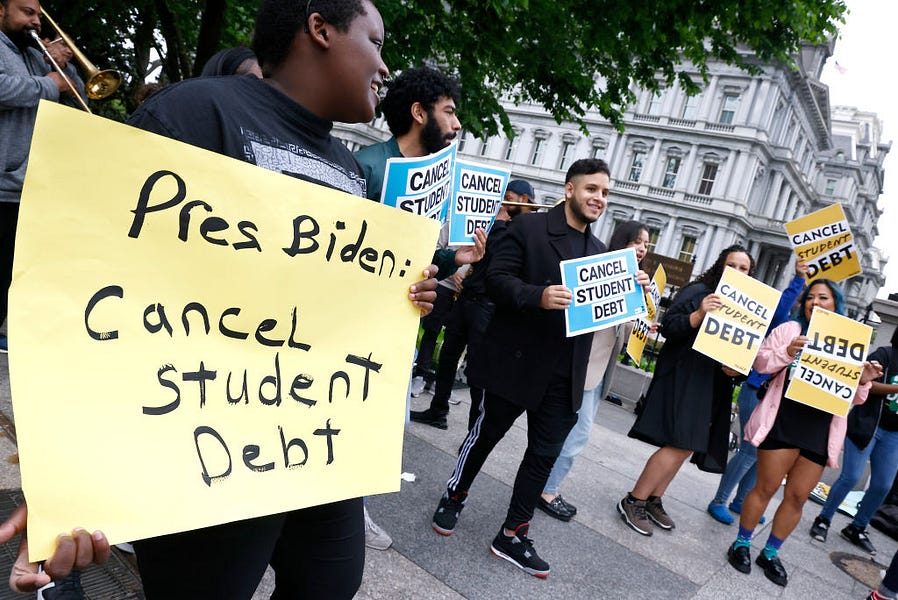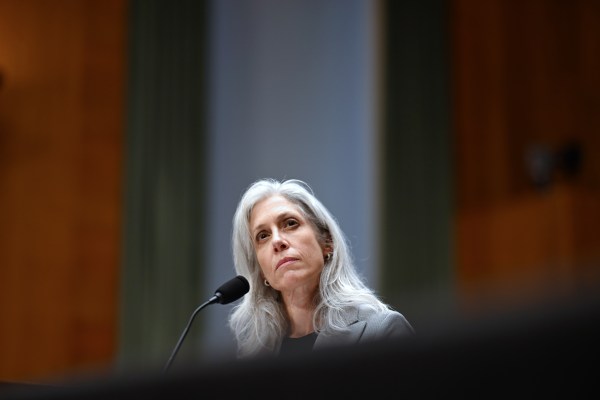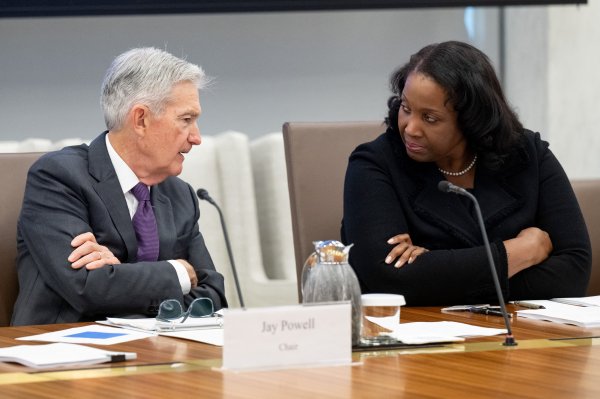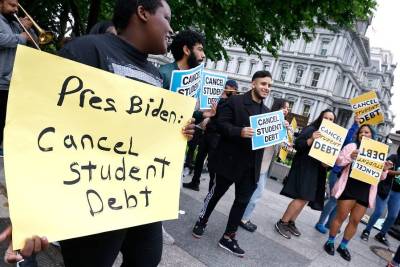When President Joe Biden said Wednesday that he would wipe out hundreds of billions of Americans’ college debt—$10,000 for every debt holder making less than $125,000 a year, $20,000 if the holder had attended college on Pell Grants—most critics focused on the move’s arbitrariness, naked constituency-fluffing, and economic regressiveness. But some also found time to deride Biden’s seemingly ludicrous justification for why he had the statutory authority to make the move in the first place: a post-9/11 law giving the White House authority to reduce the student debt of those who “suffered direct economic hardship as a direct result of a war or other military operation or national emergency.” The national emergency in question, Team Biden argued, is the ongoing COVID-19 pandemic.
A flimsy, backfilled fig-leaf justification? Sure. But don’t assume that means it won’t hold up in court. The reality is that the president’s emergency powers are significantly broader than you'd likely expect.
Under current law, as soon as a president declares a particular state of affairs a national emergency, he unlocks for himself remarkable powers to act without the consent of Congress in a host of different policy areas. These powers—136 in all, cobbled together in a heap of different congressional acts over the years—are wide-ranging and frequently vague in their limitations. They mostly amount to giving the president permission to suspend or alter the ordinary function of various federal laws.
It’s easy to see why such mechanisms exist: Legislating can be sluggish, and in times of real crisis the national interest often demands that the executive be able to act quickly and decisively. But no law sets what the parameters of such an emergency must be. A national emergency is what the president says it is, lasts as long as he says it lasts, and only a veto-surmounting two-thirds vote in both houses of Congress can overrule one. The only real limit is the scale of the president’s own hubris.
If this seems like a concerningly large loophole in a system that prides itself on its carefully calibrated system of checks and balances, it is! And in fact nobody actually chose to set things up in precisely this way. Per the National Emergencies Act of 1976, a resolution passed by simple majorities in both houses of Congress could block or end a national emergency—a relatively common feature of many statutes of the era that delegated power to the executive, known as the legislative veto. But the Supreme Court declared the entire legislative veto mechanism unconstitutional in 1983, giving the president veto power over resolutions overriding his emergency declarations and kneecapping Congress’ ability to check presidential power.
Still, for decades with multiple presidents exercising such authority, this new arrangement rarely created political controversy. But that changed in a big way in 2019 when former President Donald Trump, after trying and failing for years to get Congress to fund his border wall, declared the situation on the border a national emergency, unlocking a statutory ability to divert funds appropriated for military construction to the project. The Democratic House and Republican Senate repeatedly passed resolutions to cancel this emergency, which Trump simply vetoed.
Here, too, the authority was at best a tortured application of a vaguely written statute, and the decision immediately invited legal challenges. But despite some adverse rulings from lower courts, the Supreme Court allowed construction of the wall to go forward pending its decision on whether to take up the case, which ultimately became moot when Biden took office and pulled the plug on the project.
For some in Congress, the affair was a striking reminder that a president with the will to do so had much more extensive powers to go around them than they had previously believed. GOP Sen. Mike Lee introduced legislation to restore a version of the pre-1983 status quo while avoiding the specific mechanism of the legislative veto. Rather than giving Congress the power to overturn emergencies, Lee’s ARTICLE ONE Act, cosponsored by more than a dozen Senate Republicans, would have caused national emergencies to expire automatically after 30 days unless Congress passed a resolution approving them to continue for a longer period.
Initially, Lee tried to tempt Trump himself to sign onto the legislation, essentially offering unified Republican support to let the border wall emergency through under the current rules so long as Trump agreed to close the door behind himself. That plan imploded, with Trump declining the bait and Democratic leaders savaging it as a mere face-saving measure. Lee and his allies kept pushing forward, and, pitching the measure not as the strategic need of a particular moment but as a piece of all-upside good-government policy, they found a more receptive audience among both parties. In November 2019, the Senate Committee on Homeland Security and Governmental Affairs advanced the bill out of committee on an 11-2 vote, and similar measures were introduced in the House the following year.
During this Congress, it has been House Democrats taking up the charge, rolling the ARTICLE ONE Act’s national emergency provisions into last year’s Protecting Our Democracy Act, a package of reforms designed to strengthen various constitutional guardrails around presidential behavior. Ironically (and foolishly), many House Republicans came to see the bill as nothing more than a personal referendum on Trump, and they ended up opposing it in near unison. Nevertheless, the package passed the House last December. It has yet to be taken up by the Senate.
Biden’s move to forgive student loan debt this week could heighten scrutiny of presidential emergency powers in Congress, although winning enough support to take action—as many Democrats supported his decision—could prove challenging.
House Oversight Leadership Race Underway
House Democrats are vying for the top leadership position on the prominent House Oversight and Reform Committee in the upcoming Congress.
The jockeying comes after the current chair of the panel—Rep. Carolyn Maloney—lost a primary race on Tuesday to represent a redrawn New York district that pitted her against another top Democrat, Rep. Jerrold Nadler, who chairs the Judiciary Committee.
By Wednesday afternoon, it was clear that at least two Democrats would vie for the spot, with a few other names in the mix. If Democrats keep the House in the midterm elections, the top Democrat would serve as chair of the committee, leading investigations and setting the agenda. If Republicans take the House, the top Democrat on the panel would play a major role in Democrats’ response to any number of potential GOP investigations into the Biden administration. The election will play out at the start of the 118th Congress, with a vote among Democratic lawmakers in January.
Rep. Gerry Connolly, a Virginia Democrat who chairs the subcommittee on government operations, said he would run for the position: “Our Caucus must continue to repair the damage left by the Trump administration, while also protecting the progress made by President Biden and our Democratic majorities,” he wrote in a statement to his colleagues. “We need a tested leader who will not be timid in the face of Republican insurrectionists.”
Rep. Stephen Lynch of Massachusetts, chair of the national security subcommittee, also announced he will run. In his statement, Lynch emphasized he is the most senior Democrat seeking the top spot.
“In the midst of the recent attacks on our democracy and against the Congress itself, the role of the Oversight Committee is more important than ever,” Lynch said. He added that he would prioritize member collaboration and latitude for individual lawmakers to “showcase their diverse talents and areas of keen interest.”
Some members are already rallying around another option, though: Rep. Jamie Raskin of Maryland, a constitutional law professor who led the House impeachment managers in the second impeachment of former President Donald Trump. Raskin told Punchbowl News’ Heather Caygle this week he is “strongly considering” a bid for the role.
California Rep. Ro Khanna, a committee member with influence among progressives, has endorsed Raskin.
“He has done a masterful job standing up for democratic principles and norms and embodies the highest ideals of patriotism,” Khanna tweeted Wednesday. “He is meant to lead in this moment.”






Please note that we at The Dispatch hold ourselves, our work, and our commenters to a higher standard than other places on the internet. We welcome comments that foster genuine debate or discussion—including comments critical of us or our work—but responses that include ad hominem attacks on fellow Dispatch members or are intended to stoke fear and anger may be moderated.
With your membership, you only have the ability to comment on The Morning Dispatch articles. Consider upgrading to join the conversation everywhere.